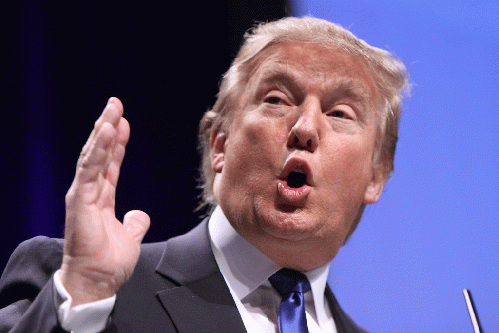From Progressive
Lawsuits over the January 6 insurrection rely on an 1871 statute against attacks on civil rights.
Can House Democrats -- Bennie Thompson of Mississippi and Eric Swalwell of California -- bring Donald Trump at long last to justice? They think they've found a way, based on an 1871 statute originally enacted to stop the Ku Klux Klan from harassing newly freed African Americans.
Thompson and Swalwell participated in the joint session of Congress that convened on January 6 to certify Joe Biden's electoral victory, only to have their lives put in danger by the violent insurrection staged by Trump supporters at the U.S. Capitol. In separate federal lawsuits filed in the District of Columbia, the two Democrats allege that Trump conspired to incite the insurrection as part of a well-orchestrated plot to overturn the election results and stop the peaceful transfer of power to a new administration.
Thompson, whose case was filed in February, names Rudy Giuliani and the neo-fascist Proud Boys and Oath Keepers organizations as Trump's co-conspirators. Swalwell, whose suit was filed in early March, omits the Proud Boys and the Oath Keepers, but also names Giuliani, along with Republican Representative Mo Brooks of Alabama and Donald Trump Jr., as defendants.
Although Swalwell's complaint is more detailed, both lawsuits contend the plot to subvert the election began during the presidential campaign and culminated in the insurrection. Both cases rely on a rarely invoked provision of the Ku Klux Klan Act of 1871, which passed in the aftermath of the Civil War. The statute has remained on the books and is now codified as section 1985(1) of title 42 of the United States Code.
Designed to prevent attacks on civil rights, the section authorizes lawsuits for money damages to be brought whenever "two or more persons conspire to prevent" public officials from discharging their duties.
Swalwell's complaint also cites another provision of the 1871 Act that authorizes lawsuits against anyone who knows about civil-rights conspiracies and has the power to stop them, but neglects to do so. And the complaint includes counts against Trump under District of Columbia law for incitement to riot, negligence, and infliction of emotional distress.
Only time will tell whether either or both lawsuits will succeed. Legal experts who have reviewed the cases thus far have returned mixed reviews.
In a March 9 interview on MSNBC with Lawrence O'Donnell, Harvard Law School professor Lawrence Tribe, one of Trump's most prominent critics, praised Swalwell's lawsuit and predicted that it will survive a motion to dismiss and make its way to trial.
"The case is quite invulnerable to any legal challenge," Tribe said. "Its factual allegations are very specific" and the case "will provide an important way for accountability to take place."
But in an interview with Newsmax, former Harvard Law professor Alan Dershowitz likened the case to "suing God for writing the Bible." Dershowitz, who abandoned his liberal past to become one of Trump's chief apologists, termed the lawsuit "a political stunt, the implications of which are mind-boggling" for attempting to hold the ex-president liable simply for stating his views about the election.
Taking a middle position, Jessica Levinson, a professor at Loyola Law School in Los Angeles, said in an interview with Reuters that Swalwell's lawsuit was "not a slam dunk" but might require Trump to sit for a deposition.
"As with so many suits against Trump, the name of the game may be to keep the suit going long enough to take depositions and obtain discovery," Levinson said.
Even if Trump manages to dodge both lawsuits, his legal troubles will be far from over.
(Note: You can view every article as one long page if you sign up as an Advocate Member, or higher).






